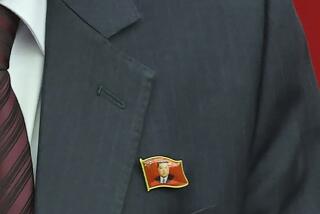Japan’s Ethnic Koreans Break With the North
- Share via
TOKYO — North Korean leader Kim Jong Il seems desperate for better relations with Japan. But there are obstacles--including a man named Kim Jong Il.
Born two years earlier than the North Korean leader, the other Kim Jong Il, a businessman in Japan, was a true believer in and fund-raiser for the North Korean regime until he visited the country in 1980.
“I have been asked hundreds of times to change my name,” the dissident Kim Jong Il said in a telephone interview from Kobe. Instead, Kim--who was born in what is now South Korea--has switched his North Korean citizenship to South Korean.
And after years of fearful silence, last month Kim and 57 others broke with Chosensoren, the Japanese organization of ethnic Koreans who are pro-North Korea, and publicly denounced the Kim Jong Il government as “feudal” and repressive.
Anti-North Korean sentiment in Japan is running high. The founding of dissident Kim’s “Democratic Mugunghwa” brings to at least six the number of grass-roots groups here demanding that North Korea democratize, demilitarize, respect human rights and free foreign “hostages,” immigrants and abductees.
While Kim was testifying before Parliament last month, the Japanese Foreign Ministry was busy conducting secretive negotiations with North Korean officials in Beijing.
In a startling turnabout, the North has promised to allow an unspecified number of Japanese women who emigrated to North Korea with their Korean husbands to return for their first visits in more than three decades.
This about-face has prompted speculation about whether famine-stricken North Korea is now sincere about mending fences with Japan. Tokyo has refused to send food aid until it gets answers about the alleged abductions of up to 19 Japanese citizens by North Korean agents.
But some observers fear that a homecoming for the elderly Japanese may end up being a propaganda boon to a regime that stands accused of mistreating--and in some cases executing--some of the estimated 93,000 Japanese and Japanese-born Koreans who have emigrated to North Korea.
About 1,831 Japanese women were among those who departed for what they believed would be a “socialist paradise.” Most left between 1959 and 1961, with the promise that they would be able to return for visits after three years. Some have never been heard from again.
However, over the past decade, a Japanese citizens group has located at least 538 wives who are still alive.
Haruhisa Ogawa, a Tokyo University professor and founder of another group, the Society to Help Returnees to North Korea, said the North’s policy appears to be to allow a handful of the women--certainly fewer than 20--to visit.
But he noted that such a small group would make it easy for North Koreans to keep tabs on the visitors.
“They will have to say exactly what they are told to say, so this would not be a free visit,” Ogawa said.
*
Lee Young Hwa, a Kansai University professor and anti-North Korea activist, agreed that a visit by the wives is likely, since the idea originated with Chan Song Tek, a brother-in-law of the North Korean leader.
What the North seeks are pledges of Japanese food aid for next year, when it fears the generosity of the United Nations, the Red Cross and others may run out. Moreover, Lee said, North Korea wants Japanese investment and eventual compensation for Tokyo’s World War II occupation.
Lee said the North has privately let it be known that it might be willing to return some of the abducted Japanese citizens--while claiming that it was Japanese Red Army terrorists, not North Koreans, who snatched them.
The Japanese Foreign Ministry has been closemouthed about the talks with North Korea. Officials from the two countries are scheduled to meet again in Beijing this month for more talks.
(BEGIN TEXT OF INFOBOX / INFOGRAPHIC)
The Name Game
Businessman Kim Jong Il, born Feb. 2, 1940, in what is now South Korea. Immigrated to Japan with his parents at age 3. Based in Kobe.
North Korean leader Kim Jong Il, son of Kim Il Sung, born Feb. 16, 1942, in a Siberian vilage near Khabarovsk, in what is now Russia.
More to Read
Sign up for Essential California
The most important California stories and recommendations in your inbox every morning.
You may occasionally receive promotional content from the Los Angeles Times.










